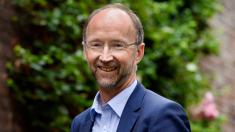
Matthew Baldwin, Chair of the Advisory Board of the UN RSF, and is the European Union’s Coordinator for Road Safety and Sustainable Mobility
The world has arrived at a critical juncture for road safety, so I am really proud to have been asked to be the Chair of the UN Road Safety Fund’s Advisory Board, starting this autumn, 2020.
It seems like a long time since we met in Stockholm last February for the 3rd Global Ministerial Conference! The conference agreed on a very powerful declaration, launching the work towards a 2nd Decade of Action on Road Safety, featuring a global target to reduce deaths and serious injuries by 50% by 2030. And even as the COVID 19 virus continued to sweep across the globe, the UN General Assembly just last August endorsed the Stockholm Declaration in a Resolution. The UNGA resolution invited Member States to invest in road safety – and specifically to support the UN Road Safety Fund.
So we have a big responsibility to fulfil in the coming years.
Around 1.35 million people are estimated will die on the world’s roads this year, as in previous years. It’s interesting to note that the number of people who die, equally tragically, from the COVID 19 virus this year is going to be pretty similar – certainly of a similar magnitude – and this despite the prodigious global efforts to halt or slow the spread of the virus. In fact, we’ve seen fewer road deaths this year in the European Union – around 2500 fewer people died in the spring because of less road traffic during the lockdown - but all the signs are that the road traffic is back, and deaths trending back towards previous levels. We’ve seen more people in the crisis embracing healthy active mobility, such as walking and cycling – but people rightly also want their mobility to be safe as well as sustainable.
Perhaps we will look back on this period and remember: that’s when we decided to act decisively against road trauma too.
The UN RSF has the potential to be a crucial player in that fight.
To work effectively, the Fund has to be about partnerships delivering relief from road trauma.
Partnerships between a diverse group of donors, including government bodies like the European Union, private sector players like Total and Michelin, foundations like the FIA Foundation – together with other stakeholders like the road safety NGOs who do so much for road safety across the world, often operating on a shoe string.
Partnerships within the UN system as the different agencies like WHO and regional commissions like UNECE with with outside stakeholders to deliver road safety projects to save lives in the Global South.
And partnerships with other funds like the World Bank’s Global Road Safety Facility so we complement and combine our efforts to tackle road deaths.
We are just about to launch / we have just launched a new Call for 4 million dollars’ worth of new projects, focusing on such issues as speed, protecting vulnerable road users, and of course focusing on low and middle countries. Frankly, I wish we had MORE money to spend - so I hope we will see more money flowing into the fund in coming years both from existing and new donors! Because it is clear from last year’s call that there is a huge appetite out there to put together practical schemes to tackle road trauma and not enough money to back them.
The struggle against COVID19 has the world’s finest medical and epidemiological brains working round the clock to find a solution to beat the virus. But we know what has to be done to deliver road safety: we need to act on the Safe System principles which we know can save lives. The UNRSF is there to fund these actions – and we are ready to work with you!

